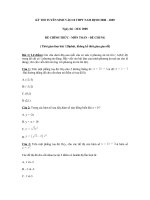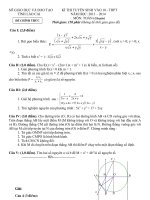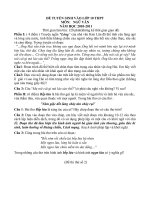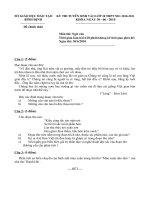đề thi tieng anh vao 10 thpt năm 2013 tinh nam dinh
Bạn đang xem bản rút gọn của tài liệu. Xem và tải ngay bản đầy đủ của tài liệu tại đây (112.35 KB, 2 trang )
TRƯỜNG THCS ĐỀ THI THỬ LẦN 3 VÀO LỚP 10 NĂM HỌC 2013 - 2014
GIAO LẠC MÔN THI: TIẾNG ANH ht ngày 10-6-2013
(Thời gian làm bài 60 phút - không kể thời gian giao đề)
Thí sinh làm bài trực tiếp vào tờ đề này
Full name:……………………………… Class: 9…
PART A: PHONETICS (1,0 marks)
Câu 1. Choose the underlined part that is pronounced different from others. (1,0 mark).
1. A. Heavy B. Head C. Bread D. Weak
2. A. Nationality B. Examination C. Nation D. Information
3. A. Funnel B. Dump C. Hug D. Pollute
4. A. Watch B. Chemistry C. Kitchen D. Catch
5. A. Stayed B. Walked C. Stopped D. Washed
PART B : GRAMMAR AND VOCABULARY (3,0 marks)
I. Circle the best answer to complete these sentences. (2 marks)
1. They spent all morning________ their homework.
A. do B. to do C. doing D. done
2. Swimming every day is a ________way of keeping fit.
A. good B. better C. best D. well
3. She stays at home because she has to look __________her baby.
A. at B. for C. after D. up
4. Don't forget ___________ the door when you go out.
A. lock B. locking C. to lock D. for locking
5. He is not very good ____________ English.
A. in B. on C. for D. at
6. My uncle is a _________. He has a large collection of musical instruments.
A. musically B. music C. musician D. musical
7. If I ____________ you, I'd take some rest before the exam tomorrow.
A. is B. were C. would be D. are
8. People in Israel is going to celebrate their festival_________is called Passover.
A. where B. which C. whose D. who
9. _____________ it was raining heavily, we went out without a raincoat.
A. So B. Although C. However D. Because
10. The children don't like living in the countryside, _________?
A. do the childen B. don't the childen C. don't they D. do they
II. Supply the correct verb form ( 1mark).
1. Mr. Pick is a bank manager. He (be)_____________________here for ten years.
2. Alan wouldn't be overweight if he (not eat)_______________________so much.
3. Linda (wash)___________________her hands every day.
4. I'm not in a hurry. I don't mind ( wait) ____________________.
5. It ( rain)__________________very heavily when we left home this morning.
PART C: READING COMPREHENSION (3 marks)
I . Read the following passage, choose the correct answer to questions ( 1 mark)
Many tourists like to send postcards to their friends and family. They send them when they
are on holiday. These postcards often have pictures on one side and a message can be
(1) on the other. The pictures on them are ( 2) the photos they take. The
first postcards were sent at the end of the nineteenth century. There was a picture of a town
(3) them. Later on, they had pictures (4) important events. People liked
to see them (5) there were not any pictures in the newpapers then.
1. A. write B. writing C. written D. wrote
2. A. good B. better C. best D. better than
3. A. on B. in C. at D. about
4. A. showing B. show C. showed D. shown
5. A. although B. because C. so D. however
II . Read the passage then answer the questions.( 2 marks)
Information about what has happened in the world, in our country, in our area, or even in our
town comes to us in many ways. People who can read often get the news from media. Because
many people in the world are iliterate, however, they get the news from television or radio.
Newspapers around the world are similar in many ways. They all have stories that tell people
about the events of the day or week. Often, papers have other purposes that are devoted to
business, sports and maybe the latest fashion news. Papers usually appear weekly or every day,
but in some places they may only appear monthly. Magazines are another way that some people
get the news. They are longer and usually appear slower. Television and radio are two other ways
of the news. They get the news out faster than the newpapers and magazines, and the stations
broadcast the news several times each day.
1. Where do people who can read get the news from?
2. How do the illiterate pepple get the news?
3. What are the purposes of newspapers around the world?
4. Which appears quicker, a newspaper or a magazine?
5. What does the word “ They” in line 9 refer to?
A. newspapers B. television and radio C. the news D. magazines
PART D: WRITING (3marks)
I. Rewrite the following sentences so that they are nearest meaning to the sentence
printed before. (1,5 marks)
1. Those boys liked to walk in the rain.
Those boys enjoyed
2. She gave me an interesting book on my birthday.
I
3. “ Which grade are you in”, she asked John.
She asked John
4. It way very cold, but he still went out without a coat.
Although
5. I can’t speak English well, so I can’t apply for the job.
If
II. Use the given words write complete these sentences. (1,5 marks)
1. She / suggest / go out / a meal after work.
2. If you / stay up late / you / be tired / tomorrow.
3. It / difficult / learn English / without / good dictionary.
4. Last Sunday / I / have /a wonderful trip / my home village / my parents.
5. I’m disappointed / you / not get / good marks / English - speaking test.
The end









